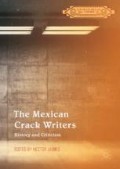Abstract
González discusses how through the reading of In Search of Klingsor, within the context of a Latin American tradition that has Borges as its main literary model and as a critical rewriting of the Boom’s “total novels,” we can appreciate this novel as a profound reflection on the paradoxical links between science and magic, art and oppression, totalization and totalitarianism, and as an ultimately fruitful experiment at writing a Latin American novel without an explicit national referent. In this sense, In Search of Klingsor’s additional concern with psychology and fiction writing can be seen as an overture and a touchstone of Volpi’s subsequent novels and essays of the early twenty-first century, from Leer la mente (2001) to La tejedora de sombras (2011).
Any sufficiently advanced technology is indistinguishable from magic.
---Arthur C. Clarke, Profiles of the Future (1962), 36.
Access this chapter
Tax calculation will be finalised at checkout
Purchases are for personal use only
Works Cited
Aguirre Romero, Joaquín María and Yolanda Delgado Batista. “Jorge Volpi: Las respuestas absolutas siempre son mentiras.” Espéculo. Revista de estudios literarios. Universidad Complutense de Madrid. 11 (1999). Web. Sep. 22, 2016. http://www.ucm.es/info/especulo/numero11/volpi.html.
Barrow, John D. The World Within the World. Oxford: Clarendon Press, 1988. Print.
Benjamin, Walter. Illuminations: Essays and Reflections. New York: Schocken Books, 1969. Print.
Bolaño, Roberto. La literatura nazi en América. Barcelona: Anagrama, 2010. Print.
Borges, Jorge Luis. “El arte narrativo y la magia.” Obras completas I. Buenos Aires: Emecé, 1996. 226–232. Print.
______. “Tlön, Uqbar, Orbis Tertius.” Obras completas I. Buenos Aires: Emecé, 1996. 431–443. Print.
Carpentier, Alejo. El reino de este mundo. Barcelona: Seix Barral, 2002. Print.
Chandrasekhar, Subramanian. Truth and Beauty: Aesthetics and Motivation in Science. Chicago: U of Chicago P, 1987. Print.
Clarke, Arthur C. Profiles of the Future. New York: Harper & Row, 1962. Print.
Crack. Instrucciones de uso. Chávez Castañeda, Ricardo et al. México: Mondadori, 2004. Print.
Domínguez Michael, Christopher. “La patología de la recepción.” Letras Libres. México 63 (2004): 32–36. Print.
Fukuyama. Francis. The End of History and The Last Man. New York: Free Press, 1992. Print.
Goebel, Robert O. “Volpi’s Klingsor: Science, Mann, Magic, and the Middle Ages.” West Virginia University Philological Papers 46 (Fall 2000): 86–91. Print.
Head, Dominic. The Cambridge Guide to Literature in English. Cambridge: Cambridge UP, 2006. Print.
Hofstader, Douglas R. Gödel, Escher, Bach: An Eternal Golden Braid. New York: Vintage Books, 1979. Print.
McAllister, James W. Beauty and Revolution in Science. Ithaca, NY: Cornell UP, 1996. Print.
Ortega y Gasset, José. La deshumanización del arte. Madrid: Ediciones de la Revista de Occidente, 1976. Print.
Spitzer, Leo. La enumeración caótica en la poesía moderna. Tr. Raimundo Lida. Buenos Aires: Coni, 1945. Print.
Thrower, James. Religion: The Classical Theories. Washington DC: Georgetown UP, 1999. Print.
Volpi, Jorge. “El profeta de América Latina.” Mentiras contagiosas. Madrid: Páginas de Espuma, 2008. 173–176. Print.
———. El fin de la locura. México: Planeta, 2003. Print.
———. En busca de Klingsor. Barcelona: Seix Barral, 1999. Print.
———. Leer la mente. México: Alfaguara, 2011. Print.
———. La tejedora de sombras. México: Planeta, 2012. Print.
Weinberg, Steven. Dreams of a Final Theory. New York: Pantheon Books, 1992. Print.
Author information
Authors and Affiliations
Corresponding author
Editor information
Editors and Affiliations
Rights and permissions
Copyright information
© 2017 The Author(s)
About this chapter
Cite this chapter
González, A. (2017). Science, Art, and Magic: Totalization and Totalitarianism in Jorge Volpi’s in Search of Klingsor . In: Jaimes, H. (eds) The Mexican Crack Writers. Literatures of the Americas. Palgrave Macmillan, Cham. https://doi.org/10.1007/978-3-319-62716-8_5
Download citation
DOI: https://doi.org/10.1007/978-3-319-62716-8_5
Published:
Publisher Name: Palgrave Macmillan, Cham
Print ISBN: 978-3-319-62715-1
Online ISBN: 978-3-319-62716-8
eBook Packages: Literature, Cultural and Media StudiesLiterature, Cultural and Media Studies (R0)

